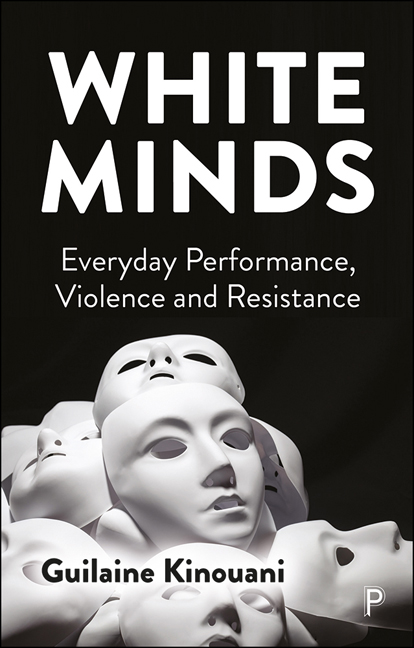Book contents
- Frontmatter
- Dedication
- Contents
- Acknowledgements
- Preface
- Note on language
- Introduction
- 1 Whiteness, time and space
- 2 White gazes
- 3 White envy
- 4 White sadism
- 5 White trauma
- 6 White dissociation
- 7 White shame
- 8 White ambivalence
- 9 White complicity
- Whiteness and resistance: by way of conclusion
- References
- Index
- Frontmatter
- Dedication
- Contents
- Acknowledgements
- Preface
- Note on language
- Introduction
- 1 Whiteness, time and space
- 2 White gazes
- 3 White envy
- 4 White sadism
- 5 White trauma
- 6 White dissociation
- 7 White shame
- 8 White ambivalence
- 9 White complicity
- Whiteness and resistance: by way of conclusion
- References
- Index
Summary
My years in academic psychology have, beyond the shadow of a doubt, been the most distressing years of my adult life. … Whenever I reflect on these times, it is the faces of white middle-class women I see. Smiling.
(Kinouani, 2021, p 14 [1])A cultural note
In May 2020, the world was shaken to its core when the videoed killing of George Floyd by white police officer Derek Chauvin in Minneapolis took place. This act of extraordinary yet banalised police brutality resulted in possibly the largest wave of global protests and riots in living memory. For several months, and across the world, hundreds of thousands of people took to the streets in anger, despair and distress, dissenting at what seems like unrelenting police violence against black bodies. In the US, largely peaceful but resolute protests were met with largely violent repression. Scenes of protesters being roughly handled, aggressively apprehended, hit with batons, tear gas or rubber bullets by a heavily armed and militarised police force were repeatedly spread across our screens. Via national news, on our social media timelines, and for many of us in our dreams too. In the midst of the chaos, I tried as much as I could to spare my mind from witnessing the events too closely. I avoided the video like the plague. It took me several months before I found it in me to watch the infamous recording. But for the need to write the present chapter, I do not believe that I would have had any inclination to do so. Like many, across the globe, the mere written description of the events leading to Floyd’s death, the incessant news reporting, were tortuous enough. They were triggering enough. The word trigger has unnecessarily become controversial, in large part because of right-wing media pundits who have, over the years, perverted its original meaning and taken it as symptom of what they describe as a manifestation of ‘snowflake’ culture allegedly infringing on the capacity to speak freely. But understanding psychological triggers is important to understanding the effect of whiteness on all of us. We speak of triggers when we are dealing with trauma.
- Type
- Chapter
- Information
- White MindsEveryday Performance, Violence and Resistance, pp. 68 - 84Publisher: Bristol University PressPrint publication year: 2023



